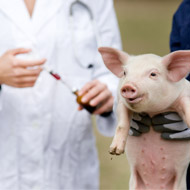
Sector must continue to improve communications, says NOAH
The British public are growing more aware of veterinary medicines and the vital role they play in the health and welfare of animals.
This was one of the findings from the first-ever survey of European public knowledge and attitudes to animal medicines commissioned by NOAH’s European Federation IFAH-Europe.
The survey questioned 6000 individuals across Europe and shows the knowledge and attitude of UK citizens compared to the average of those countries as a whole.
It found that while UK citizens are generally more aware than their European counterparts, there is still room for improvement.
In light of the findings, NOAH is calling on the sector to continue to improve communications in key areas like antibiotic resistance, food security and diseases, 'as many misunderstandings still exist'.
“In general, we in Britain are quite well informed about the benefits of animal medicines,” said Dawn Howard, chief executive of NOAH.
“NOAH has commissioned similar research in the UK before, and we have been addressing misunderstandings, explaining why and how animal medicines are used to support both animal and public health.
“Many people understand that medicines help support the health and welfare of animals, especially their pets. Yet overall almost 40 per cent of people across Europe still do not realise animal medicines have a positive impact on farm animal health.
“Nevertheless, looking to the future, the good news is that new technologies are being embraced across Europe, with very little difference in the views between different countries. Our industry supports innovation, whether it means a new vaccine against an emerging disease, improved diagnostics, or a medicine in a formulation that is easier to give.
“There is a certain level of trust in the authorities that control how animal medicines are authorised and controlled too. In Britain, more than half those surveyed are aware that the use of antibiotics in farm animals is regulated and controlled by the national authorities, and 61 per cent are aware that animal medicines are tested and reviewed before they are allowed to be sold,” said Mrs Howard.
“But within our industry, we can all help by doing more to promote understanding of the stringent controls that govern our sector and help address any misunderstandings that still exist.”
The survey revealed that 74 per cent of British people know that farm animals are vaccinated to prevent sickness (71 per cent in the EU).
Looking at awareness of farm animals given medicines to prevent internal parasites, 70 per cent of Brits said they were aware of this, with just 17 per cent saying they were not. Meanwhile, just 62 per cent of Europeans said they were aware of this, and 22 per cent said they were not.



 The Veterinary Medicines Directorate (VMD) is inviting applications from veterinary students to attend a one-week extramural studies (EMS) placement in July 2026.
The Veterinary Medicines Directorate (VMD) is inviting applications from veterinary students to attend a one-week extramural studies (EMS) placement in July 2026.